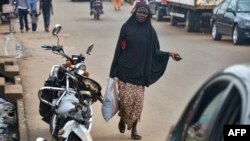The wearing by Muslim women of full-face veils, commonly called a burqa or hijab, has been banned in all of the Cameroon border areas with Chad and Nigeria where suspected suicide bombers of the Boko Haram terrorist group have been operating. The ban comes after women disguised as Muslims attacked Cameroon in a twin suicide bombing this week.
Midjiyawa Bakari, governor of the Far North Region in Cameroon, said the decision to impose the ban is among measures to stop suicide bombers after the country reported its first-ever suicide bomb attack in the town of Fotokol on the border with Nigeria"s Borno state, the former stronghold of the terrorist group Boko Haram. He said the two suicide bombers, whose heads were cut off by the bombs they wore, were women wearing face veils.
"Most of the suicide bombers, is not all who were reported [both in Cameroon and Chad] were disguised in veil popularly called burqa. And so we are today more than ever before calling on the population of this region to be on the alert and to report to the authorities any suspicious activity or person,” he said. “It is not only about the veil or burqa, but about any activity which is likely to jeopardize our peace and security. This means that all citizens should participate in protecting this beautiful nation from enemies like Boko Haram militants."
About 20 percent of Cameroon's 22 million people are Muslim, 40 percent are Christians and the rest hold various traditional beliefs. Sunnis make up 75 percent of the Muslims. And Shi'ites, who insist on wearing the veil, constitute about 25 percent.
Mairama Aboubakarr was traveling from Far North Cameroon, where the ban is effect, to the capital Yaounde with her burqa covering all of her face. She told VOA she was respecting a religious obligation.
She said Islam makes it an obligation for each women to wear a burqa because it is decreed by God through his prophet Mohamed to preserve a woman's dignity. She added it is also very important because it preserves the woman and adds value to the Muslim culture.
Aboubakarr said wearing the veil is not negotiable even if arrested. She said she is not afraid. It is unlawful in Islam to arrest someone just because she wore a veil which is an obligation from God. It is not permitted, she said.
Mouhaman Sani, from the central mosque in Maroua, Far North, Cameroon, said barely a day after the ban was announced, there were crackdowns on Muslims when it has not been established the suicide bombers were Muslims.
He said not only Muslims wear such veils and many people have been hiding behind it and behind Islam to commit atrocities, so he thinks that the government should tackle the issues instead of persecuting Muslims. He said non-Muslims can wear and are wearing burqa's
Ntouda Ebode, a geopolitical scientist said Cameroon was late in banning the burqa.
He said Cameroon should have banned the burqa when Chad announced it had banned it because the two countries are in the same coalition fighting against Boko Haram.
Last month, Chad also banned full-face veils after suicide bombers used them and attacked the country.




